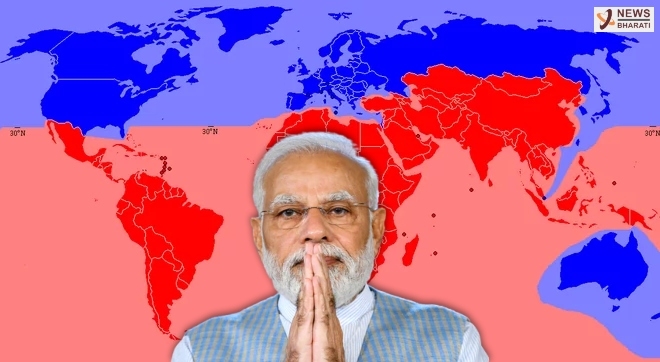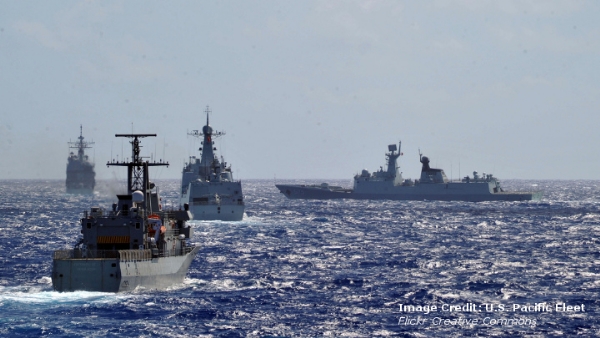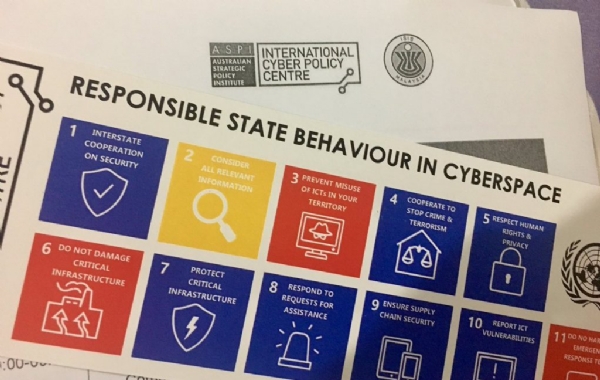Securing Global South Countries from Geo political and security challenges: Part 1
As part of my mandate, I have been assigned to focus on the geopolitical, defense, and security challenges confronting Global South countries, and to provide recommendations for overcoming them.
Total Views |
As the world confronts the threat of global stagflation, India is among the few countries that have the potential to emerge as a winner in this situation. There are several challenges related to geopolitics, security, and technology that need to be addressed. If India can help the Global South countries find a way forward, then the prediction that "this century belongs to Asia, and this year 2023 belongs to India" may well come true.

The G-20 meetings scheduled for 2023 provide a significant opportunity to promote "Vasudhaiva Kutumbakam" and provide practical solutions to the challenges of the 21st century, which affect the world as a whole and the Global South, in particular. As the host, India has the opportunity to implement successful solutions and achieve pragmatic targets that will benefit humanity.
Despite having various forums such as the United Nations General Assembly, United Nations Security Council, and other UN bodies that are meant to discuss and solve world challenges, they have unfortunately turned into battlegrounds for powerful countries such as the USA, China, Europe, and other developed nations. These powerful nations often use their veto power to safeguard their national interests, leaving little room for issues related to the Global South and other regions to be discussed.
This situation needs to change, and as the G-20 President, India must find practical solutions to the challenges faced by the Global South. India aims to address this issue in various G20 meetings scheduled throughout the country in 2023.
This paper explores the fundamental principles of India's ancient wisdom and identifies areas where India's G20 Presidency could offer a distinctive and crucial contribution to the global community. By providing a unique leadership approach, India can showcase its leadership qualities in style and content, emphasizing the importance of pragmatism, global justice, and sustainable development.
As part of my mandate, I have been assigned to focus on the geopolitical, defense, and security challenges confronting Global South countries, and to provide recommendations for overcoming them. The following paragraphs discuss these challenges in detail and provide practical solutions for addressing them.
- Geo political challenges facing Global South Countries
- Security Challenges facing Global South Countries
- Countering Chinese Political Warfare Against Pacific/Oceania Island States
- Security Challenges Faced By ASEAN Countries
Geo political challenges that Global South Countries Face
The Global South is a term used to describe the regions of Latin America, Asia, Africa, and Oceania, which are characterized by low-income and often politically or culturally marginalized communities outside of Europe and North America. These regions face various geopolitical challenges, such as economic underdevelopment, political instability, environmental degradation, social inequality, poverty, economic inequality, discrimination, and climate change. Addressing these challenges would require a multifaceted approach that involves tackling economic, social, and environmental concerns, promoting political stability and good governance, as well as fostering international cooperation and solidarity.
Geo political challenges that Global South Countries Face
The Global South is confronted with a variety of geopolitical challenges, which include economic underdevelopment, political instability, environmental degradation, and persistent social inequalities. Some of the specific challenges include:
Economic underdevelopment and poverty: Many countries in the Global South struggle with economic underdevelopment, leading to high levels of poverty and unemployment, as well as inadequate access to fundamental resources like food, water, and healthcare. Such challenges are often linked to colonialism, neo-colonialism, and unequal global economic systems, resulting in high levels of economic inequality.
Political instability and conflict: Ongoing political instability, including civil wars, coups, and corruption, is prevalent in many Global South countries. These conflicts disrupt social and economic stability and can lead to human rights violations and humanitarian crises.
Environmental degradation and climate change: The Global South is particularly vulnerable to environmental degradation and climate change, which can severely affect agriculture, health, and livelihoods. Many of these countries are also subject to resource depletion and environmental pollution from extractive industries and other forms of economic development.
Social inequality and discrimination: Social inequality and discrimination, including gender inequality, racism, and discrimination against marginalized groups such as indigenous peoples and refugees, are prevalent in many Global South countries, leading to ongoing social unrest and political instability.
Achieving prosperity through cooperation: Overcoming Geopolitical Challenges in the Global South
Achieving a balance of interests and promoting cooperation among nations is crucial to ensure that all nations benefit from geopolitics. Here are some potential strategies that could promote cooperation and prevent conflicts:
Dialogue and diplomacy: Encouraging dialogue and diplomacy between nations can build trust, promote mutual understanding, and reduce tensions. This can involve regular meetings between leaders, diplomatic initiatives, and conflict resolution mechanisms.
Multilateralism: Encouraging the use of multilateral institutions such as the United Nations, the World Trade Organization, and regional organizations can promote cooperation, stability, and a rules-based international order.
Promoting economic integration: Encouraging free trade agreements, regional economic blocs, and other initiatives can help to foster mutual economic benefits and reduce the potential for conflicts.
Respect for international law: All nations should respect international law and the sovereignty of other nations, including adhering to international treaties, respecting territorial integrity, and avoiding interference in the internal affairs of other nations.
Strengthen democratic institutions: To address political instability and conflict, strengthening democratic institutions can help promote political stability and prevent conflicts. This includes promoting the rule of law, protecting human rights, and ensuring free and fair elections.
Addressing economic inequalities: Implementing policies to promote more equitable distribution of wealth and resources, investing in education and training programs, and implementing fair trade practices can help to address economic inequalities.
Addressing climate change and environmental degradation: Promoting sustainable development practices, investing in renewable energy, and supporting conservation efforts can help address climate change and environmental degradation.
Promoting social justice and inclusion: Policies to address discrimination, support for marginalized communities, and promoting gender equality can help promote social justice and inclusion.
Building strong alliances and promoting national interests: To resist external interference, countries in the Global South should focus on building strong alliances with other countries and international organizations. They should also work to promote their own interests in international forums and negotiations.

Enhancing regional cooperation: Regional cooperation can be a powerful tool for countries in the Global South to overcome common challenges and achieve shared goals. This can involve promoting trade, sharing resources, and addressing regional security concerns.
Prioritizing environmental sustainability: Environmental sustainability should be a top priority for countries in the Global South. This can be achieved by investing in renewable energy, protecting natural resources, and reducing carbon emissions.
Addressing the geopolitical challenges faced by countries in the Global South will require a collaborative effort between governments, civil society organizations, and the international community. This effort should be guided by a shared commitment to promoting social, economic, and environmental justice, and to building more equitable and sustainable societies for all.
Security challenges that Global South Countries Face
We will explore some of the critical challenges faced by countries in the Global South and suggest potential strategies to overcome them.
One of the most pressing security challenges that Global South nations encounter is the ongoing conflict and violence they experience. For many years, civil war, insurgency, terrorism, and other forms of violence have afflicted these nations, making it challenging for governments to provide essential services to their citizens, stimulate investment, and foster a stable economy.
Another significant challenge that Global South countries confront is economic inequality and poverty. Despite substantial progress in recent years, these nations still face high levels of poverty, inequality, and unemployment, which can be compounded by factors such as corruption, weak governance, and limited access to markets and resources.
A third challenge that Global South countries face is climate change and environmental degradation. Many of these nations are highly vulnerable to the adverse impacts of climate change, including droughts, floods, and storms. Moreover, environmental degradation can worsen poverty, exacerbate conflicts over natural resources, and contribute to the spread of disease.
One of the most significant geopolitical challenges confronting Global South countries is their reliance on developed nations for trade and economic development. Many Global South countries are heavily reliant on exports to developed nations, leaving them vulnerable to economic fluctuations and political pressure. Additionally, developed countries often dictate the terms of trade, leaving Global South countries with little bargaining power. This can lead to a "race to the bottom," where countries compete to offer the lowest labor costs and weakest environmental protections to attract investment.
Another geopolitical challenge faced by Global South countries is the influence of external powers. Powerful countries such as the United States, China, and Russia frequently seek to exert their influence in Global South countries, either through economic or military means. This can result in a loss of sovereignty and political instability, as Global South countries become embroiled in regional conflicts and power struggles.
Finally, another challenge facing Global South countries is the threat of terrorism and violent extremism. Many of these nations are located in regions that are prone to political instability and conflict, which can create fertile ground for terrorist organizations to thrive. Moreover, poverty, inequality, and a lack of opportunity can foster conditions conducive to violent extremism.
For the purposes of clarity, I have classified Global South countries into four categories:
- Pacific/Oceania Island States,
- ASEAN Countries,
- South and Central America Countries,
- African Countries.
SECURITY CHALLENGES
Challenges to Security Faced by Asian and ASEAN Countries in the Global South
Territorial disputes: Ongoing territorial disputes between countries such as China, Japan, and India can lead to tensions and potential conflicts in the South China Sea, East China Sea, and the Himalayan region.
Terrorism: The presence of terrorist groups, including ISIS and al-Qaeda affiliates, as well as domestic extremist groups, in Asia pose significant threats to regional security.
Cyber security: The increasing digital connectivity in Asia makes it more vulnerable to cyber threats such as hacking, data breaches, and cyber attacks on critical infrastructure.
Military modernization: Countries like China and India are investing heavily in military modernization, which may lead to arms races and heightened tensions in the region.
Overcoming These Challenges
Diplomacy and dialogue: Promoting diplomacy and dialogue to resolve territorial disputes peacefully can be achieved through negotiating agreements and confidence-building measures.
Counterterrorism cooperation: Countries can work together to share intelligence and coordinate efforts to prevent and respond to terrorist threats.

Cybersecurity cooperation: Cybersecurity cooperation, such as sharing best practices, coordinating responses to cyber attacks, and developing joint cyber defense capabilities, can promote a more secure digital landscape in the region.
Arms control and confidence-building measures: Promoting arms control measures and confidence-building measures can help reduce tensions and promote stability in the region.
Addressing security challenges in Asia requires a comprehensive approach that promotes cooperation, diplomacy, and dialogue between countries. Investment in cybersecurity and intelligence capabilities can also help prevent and respond to security threats.
Security Challenges Faced By ASEAN Countries
In November 2022, during the 25th meeting of the ASEAN Political and Security Council (APSC) in Phnom Penh, Cambodia, Indonesia's foreign minister, Retno Marsudi, proposed the ASEAN Maritime Outlook (AMO). This initiative could be instrumental in protecting maritime interests in the following ways:
Facilitating multilateral cooperation: The AMO would establish a framework for ASEAN member states to work together on maritime issues related to security, trade, and the environment. This could create a more stable and predictable environment in the Indo-Pacific, benefiting all countries in the region.
Promoting a rules-based order: The AMO would be based on international law, including the United Nations Convention on the Law of the Sea (UNCLOS). This would help to promote a rules-based order in the Indo-Pacific, which would benefit all countries that depend on the sea for trade and security.
Addressing common challenges: The AMO would enable ASEAN member states to tackle common challenges, such as maritime piracy, illegal fishing, and environmental degradation, in a coordinated manner. By working together, ASEAN member states and India could more effectively address these challenges and protect their respective maritime interests.
Encouraging dialogue and confidence-building measures: The AMO would create a platform for ASEAN member states and India to engage in dialogue and confidence-building measures, which could help to reduce tensions and build trust in the Indo-Pacific. This could, in turn, help to prevent conflicts and safeguard the maritime interests of all countries in the region.
The ASEAN Maritime Outlook could thus serve as a framework for ASEAN member states and the world to cooperate on maritime issues, promote a rules-based order, address common challenges, and encourage dialogue and confidence-building measures.
Conclusion
Global South nations encounter various intricate geopolitical and security challenges, which may impede their ability to achieve long-term economic growth and development. Therefore, it is essential for the international community, led by India, to support their efforts by providing financial aid, technical expertise, and other forms of assistance as needed. With the right strategies and resources, these countries can overcome these challenges and attain a more prosperous and sustainable future.
To enhance the security of Global South countries, a Security Action Plan should prioritize capacity-building for their military forces, strengthening institutional and legal frameworks, promoting regional cooperation, and enhancing international partnerships. It is critical to strike a balance of interests and promote cooperation among nations to ensure that everyone benefits as a united community. India is committed to pursuing this objective during the G-20/C-20 conferences scheduled for 2023.
--


